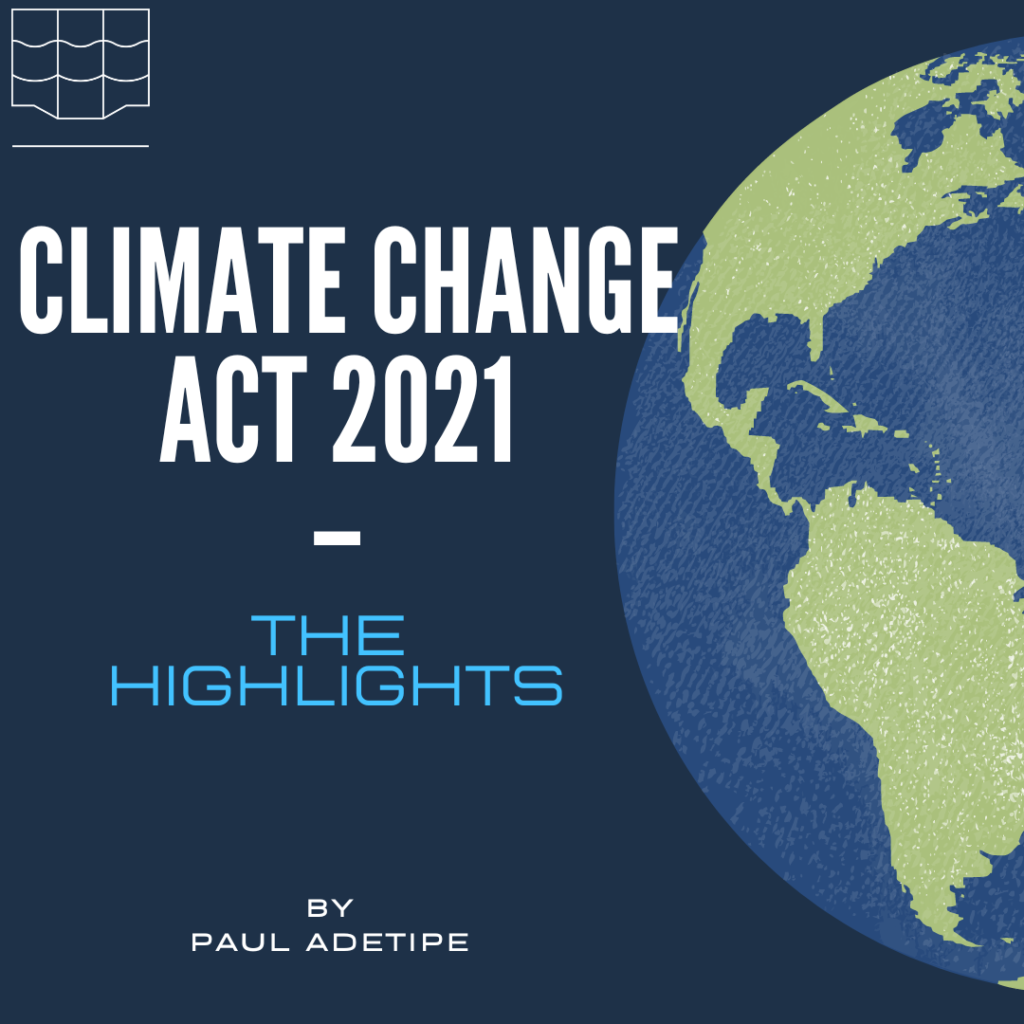BACKGROUND TO THE ACT
All around the world, a major concern that has dominated conversations among nations and people is climate change. From increased heat, to rising water levels and extreme weather, the effects of climate change are beginning to take its toll across borders. This and many other reasons informed the heads of discussion at the 2021 UN Climate Change Conference (COP26) which took place between October and November 2021 in Glasgow. The COP is an annual UN climate change conference for parties to the United Nations Framework Convention on Climate Change (“the Convention) and doubles as the supreme decision-making body of the Convention.
Nigeria, being a party to the Convention attended the COP 26 and announced its commitment to a year 2060 net zero target at the event. Further to this commitment, President Muhammadu Buhari signed the Climate Change Bill into law on November 18, 2021, barely 5 days after the COP. This article assesses the major highlights of the Act and its projected impact on the Nigerian environment and the economy by extension.
HISTORICAL BACKGROUND
Prior to the enactment of the Climate Change Act 2021, Nigeria did not have a specific local legislative framework for climate protection. However, Nigeria ratified the United Nations Framework Convention on Climate Change (UNFCCC) in 1994, and the objective of this convention was the ‘stabilization of green houses gas concentrations in the atmosphere at a level that would prevent dangerous interference with the climate system. Nigeria also acceded to the Kyoto Protocol (“the Protocol”), which was negotiated at the COP meeting in Kyoto, Japan in 1997. The Protocol sets binding emissions limitations on signatories to it but allows these countries the latitude to make their own’ decisions on how to reduce emissions.
In a bid to strengthen its commitment to the reduction of greenhouse gas emissions, Nigeria also became a party to the Paris Agreement in 2017. The Agreement set out to reduce greenhouse gas emissions by 20% by 2030. Its goal is to limit global warming to well below 2, preferably to 1.5 degrees Celsius, compared to pre-industrial levels.
Whilst Nigeria indeed ratified these conventions, treaties and protocols, they remained unenforceable as a result of non-domestication into local law. The Climate Change Act 2021 is therefore Nigeria taking internal steps to solidify the climate change goals and create an enforcement mechanism for same.
KEY FEATURES OF THE ACT
To achieve its 2050-2070 net zero target, the Act creates certain systems and structures which include:
1. THE NATIONAL COUNCIL OF CLIMATE CHANGE
The Act establishes a National Council of Climate Change 1 (“the Council”) to oversee and drive Nigeria’s climate change plans. The Council is to oversee the coordination of national climate actions, the mobilization of financial resources for the support of climate change actions, and the administration of a newly created Climate Change Fund, among others. The membership of the Council is broad and drawn from various sectors of the society and headed by the President of the Federal Republic of Nigeria as Chairman. This underscores the importance and urgency of the climate project.
With respect to the administration and control of the Council, the Act establishes a Secretariat 2 and designates it as the administrative, scientific, and technical arm of the Council. The Secretariat is to advise and assist the Council in the performance of its roles and functions under the Act. Among other functions, the Secretariat is responsible for the verification and reporting of the extent to which the national emission profile is consistent with the carbon budget. The Secretariat is also empowered to partner with civil societies in the furtherance of its objectives.
2. THE CLIMATE CHANGE FUND
The Climate Change Fund 3 (“the Fund”) is designed to cater to finances for climate actions and interventions in Nigeria and is to be funded with proceeds from carbon tax and emissions trading, fines and charges for flouting Climate Change mitigation and adaptation obligations, funding from international organizations, fees and charges for services rendered by the Council etc. The Fund is to be applied towards the cost of administration of the Council, climate change advocacy and information dissemination, funding innovative climate change mitigation and adaptation projects, and incentivizing private and public entities for their efforts towards transiting to clean energy and sustaining a reduction in GHG emissions.
The Fund, which is to be administered by the Council, is a hugely welcome development as it guarantees availability of funding for the furtherance of the objectives of the Act and the prosperity of Nigeria’s climate goals, provided that there is strict enforcement and proper allocation of the resources towards the fulfilment of its purpose.
3. CARBON TAX AND CARBON EMISSIONS TRADING
Perhaps, one of the most innovative features of the Act is the introduction of Carbon Tax and Carbon Emissions Trading 4 . The Act mandates the Council to collaborate with the Federal Ministry of Environment for the development of the mechanism for carbon tax in Nigeria, and for the development of a mechanism for carbon emissions trading in conjunction with the Federal Ministry of Trade.
1 Section 3, Climate Change Act, 2021
2 Section 7, Climate Change Act, 2021
3 Section 15, Climate Change Act, 2021
4 Section 15(1)(e) Climate Change Act, 2021
Carbon tax is a charge imposed on the burning of carbon-based fuels. It serves as a disincentive for carbon emission, by ensuring that users of carbon fuel bear the liability for the environmental damage done to the climate by the release of carbon dioxide into the atmosphere and by extension the economic damage. Carbon tax, provided it is relatively high, would serve to reduce carbon emissions in the society, and would also serve as a source of revenue which can be directly towards the transition to clean energy by the government.
Carbon Emissions Trading 5 on the other hand is the buying and selling of credits that permit a company or other entity to emit a certain amount of carbon dioxide or other greenhouse gases. Here, the government will set a cap on the maximum level of emissions allowed for entities, and issue permits or allowances for each unit of emission which can be traded by people and companies. Organizations therefore have to choose between restricting their emissions within the permitted measure or buying more permit from the government or other companies who emit lesser.
Carbon tax and carbon emissions trading are solid incentives which should facilitate a quick time reduction in carbon emission if deployed adequately and enforced judiciously. The rationale is that payment for emissions will motivate organizations to seek other alternatives to fossil fuel. This way, companies will be charged for polluting more, and others will be rewarded for emitting less.
4. CARBON BUDGET
Another insightful feature of the Act is the introduction of carbon budget 6 . The Act mandates the Federal Ministry of Environment in collaboration with the Ministry responsible for National Planning to set a carbon budget for Nigeria. The goal of the budget is to keep the average increases in global temperature within 2°C and to pursue efforts to limit the temperature increase to 1.5°C in alignment with the Paris Agreement, to which Nigeria is a party The carbon budget sets the amount of greenhouse gases that can be emitted over a period, which will keep global temperature within safe limits. The implication is that should the budget be exceeded; global temperature goes higher. This would accelerate climate change and greatly intensify its impacts. Limiting further warming requires decreasing the human spend of GHG emissions and then reducing emissions to zero. The carbon budget for each cycle is to be submitted to the Federal Executive Council for approval.
5. NATIONAL ACTION PLAN
The Act also makes provision for the formulation of a National Climate Change ActionPlan 7 which is to be formulated or reviewed in every five-year cycle by the Secretariat in conjunction with the Federal Ministries of Environment and National Planning. The Action Plan is ordained to serve as the basis for identifying the activities aimed at ensuring that the national emissions profile is consistent with the carbon budget goals. The Action
5 https://www.investopedia.com/terms/c/carbontrade.asp accessed June 2nd, 2022
6 Section 19, Climate Change Act, 2021
7 Section 20, Climate Change Act, 2021
Plan will set out the road map to the achievement of Nigeria’s climate change goals. It is expected to contain milestones, timelines for the achievement of goals, and the projection of budgetary needs for the execution of projects. The Action Plan will contain an articulated carbon budget for the five-year cycle and the years that make up the five years cycle, proposed incentives for private and public entities which achieve GHG emission reduction, etc.
6. CLIMATE CHANGE OBLIGATION
In a bid to ensure the achievement of the objectives the Act, sections 22,23 and 24 make provisions for climate change obligations of Ministries, Departments and Agencies (“MDAs”), private organisations, and public organizations. All MDAs are required to establish a climate change desk which will serve the purpose of ensuring integration of climate change activities into their core mandate. The MDAs are to comply with the annual carbon emission reduction targets of the nation and ensure adequate planning and budgeting for all climate change projects and activities. The importance of this is evidenced by the duty placed on the Ministry responsible for Finance and Budgeting to ensure that all budget proposals by MDAs have been properly vetted for climate change considerations. In the event that an MDA fails to meet its carbon emission reduction obligation, the MDA and its Principal Officers maybe subject to sanctions upon review and investigations.
For public entities, the Council is empowered to impose obligations relating to climate change on any public entity. Finally, all private entity with employees numbering 50 and above are to create measures for the achievement of the annual carbon emission reduction targets in line with the Action Plan. Private organizations in this category are also required to appoint a Climate Change Officer who is to submit an annual report on the efforts of the entity to meet its climate change targets to the Council.
7. CLIMATE CHANGE EDUCATION
Indeed, one of the most viable ways of curbing ills in the society is via education and awareness. The Act does not fall short of this. Section 26 of the Act mandates the Secretariat to advise MDAs responsible for regulating educational curriculum in Nigeria on the integration of climate change into various disciplines across all educational levels. The Secretariat may partner with MDAs in this regard or sponsor scientific research and other projects.
NEXT STEPS
The next steps would be to swing into action and get the provisions of the Act implemented. The Act appears to be enforcement driven, as it creates structures for enforcement of provisions. This is evident from the establishment of a Secretariat, and the assignment of specific obligations to the Federal ministry of Environment and the Ministry of Budget and National planning. A place to commence is the creation of the Action Plan, the Act gives a timeline of 12 months 9 from the commencement of the Act to produce the pilot Action Plan.
The mechanism for the calculation of the carbon tax and the carbon emissions trade permit should be developed earnestly, to allow public and private organizations comply earnestly.
8 Section 26, Climate Change Act, 2021
9 Section 20(2) Climate Change Act 2021
CONCLUSION
The step taken in the signing of the Climate Change Act is a welcome development, as it sets the country in motion, on the path to actualization of a net zero target by the year 2070.
Paul is Counsel in the Energy, Power and Gas team of the Firm.


